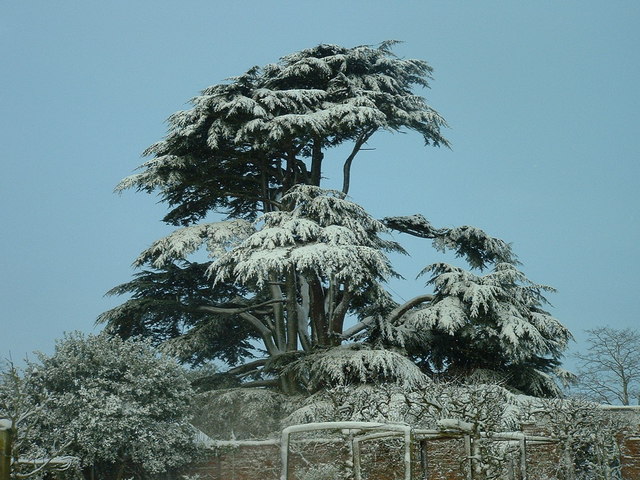The poet Alfred Lord Tennyson was born in 1809 in the village of Somersby in Lincolnshire. Many of the lines in his work were inspired by the local landscape, for example it was a small stream in the vicinity that formed the basis of The Babbling Brook. He also made frequent references to the woods in the area – “The silent woody places”.
Being a member of the aristocracy, Tennyson had friends in high places in the locality. One of them was Algernon Massingberd, the son of a local squire residing at Gunby Hall, a few miles from Somersby. Tennyson, who by all accounts had a sad family life as well as losing his closest friend at a young age, paid regular visits to the hall, and must have found great solace there. The hall is now the property of the National Trust, and visitors to the hall may notice a small framed picture above the fireplace in one of the rooms. The picture includes a few short lines describing the hall, and it is signed by Tennyson.
 |
| Gunby Hall from the west. Photo by DeFacto, via Wikimedia Commons. |
The line forms part of Tennyson’s poem “The Palace of Art”, in which he imagines an art collection in a palace and its gardens constructed by a man who converses with his soul. One of the pieces in the collection is described thus:
And one, an English home – gray twilight pour’d
On dewy pastures, dewy trees,
Softer than sleep – all things in order stored,
A haunt of ancient Peace
This is the verse reproduced in the picture above the fireplace, and it is widely thought to have been inspired by Gunby Hall.
Another of Tennyson’s most famous poems, Maud, in which Maud is urged to “come into the garden”, makes references to the “musk of the rose”. This was also probably inspired by the gardens of Gunby Hall, and there are still musk roses growing there today. Another poem which may well have been inspired by the gardens of Gunby Hall is “The Gardener’s Daughter”.
The gardens have changed a bit since Tennyson frequented them, but some features remaining would have been there at that time, such as the pigeon house and the garden seat against the west wall. As for the plants, there is a cedar of Lebanon which was planted in 1812 by Algernon’s father.
 |
| Cedar of Lebanon Gunby Hall gardens - geograph.org.uk - 1352099. Photo by Paul Gray, via Wikimedia Commons. |
Gunby Hall is a few miles inland from Skegness, at the south-east edge of the Lincolnshire Wolds AONB. In normal times (not currently, obviously), the hall, estate and gardens are open to visitors, who can visit three floors of rooms full of collections dating from 1700, as well as the eight acres of gardens.
Map of the area.
No comments:
Post a Comment